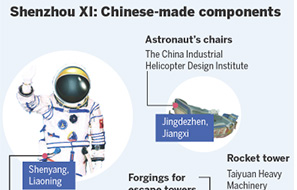Options abound for overseas students
Australia
A news report by Sydney Morning Herald in Australia said Australian National University, one of the most-renowned higher education institutions in Australia, is attempting to cut its proportion of Chinese international students as part of a "diversification strategy", which was launched last year.
Many potential Chinese applicants said they are concerned that more top-ranked universities in Australia will follow the move.
But Qian Shaoyu, China's in-country representative of the University of Adelaide, said the prestigious university does not have plans to cut the number of Chinese students it accepts.
Last year, nearly 140,000 Chinese were studying in Australia, which accounts for one-quarter of all international students, a 13-percent increase from 2014.
Italy
Italy is one of the few countries that exempts public university tuitions.
The Marco Polo Project and the Program Turandot, agreed by Chinese and Italian governments, have encouraged increasing numbers of Chinese to study in the European country. Italy also allows Chinese students to apply using their results from China's national college entrance exams.
In recent years, to attract Chinese students, Italian universities have launched courses on preservation of cultural relics, restoration of architectural heritages and ancient books.
According to Uni-Italia, an organization offering help to students who want to study in Italy, the number of Chinese studying in the European country was 3,800 in 2013, a 30-percent rise from the previous year. The number exceeded 5,000 last year, a record high.
Netherlands
The Netherlands, a non-English-speaking country, was among the first to offer English-taught courses, with the number of such courses having now reached 2,200.
Renowned subjects at universities in the Netherlands include international commerce, economy, electronic engineering, logistics and architecture.
Statistics from EU-NUFFIC, an organization for international cooperation in higher education, said there are more than 90,000 international students in the country, 8 percent of which are Chinese.
The Orange Tulip Scholarship China Program is luring more Chinese to study in the Netherlands. So far, more than 100 Chinese students have benefited from the program. For the 2017-18 academic year, 20 higher education institutions in the Netherlands will offer 62 scholarships, worth 800,000 euros ($870,000), to Chinese students.


















